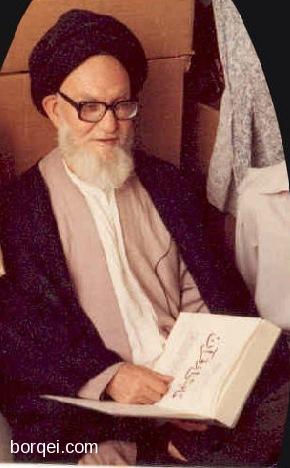Note: We will keep updating this post to add more refutations. Written by Muhammad Moin Original Article here Posted here by 13S2010
A look at evidences provided against the superiority of Abu Bakr and Umar among companions
BismillahAmong their claim is:
1. Sahaba disagreed over Tafzil among companions.
2. All of Banu Hashim preferred Ali (ra) over Shaykhain (ra).
3. This is an issue based on speculation and hence the a person holding different opinion is not going away from Sunnah.
And other related issues. I’ll start it soon.
I’ve read mainly Ghayat at-Tabjeel of Mahmud Sa’eed Mamduh on this topic. He is a Tafzili who considers Ali (ra) superior among companions. Also I have seen some portion of Zubdah at-Tahqeeq of Sayyid Abdul Qadir Jilani (a modern Maulavi, not the famous Hanbali Zahid). These two books are most famous nowadays in arabic and urdu. Ghayat at-Tabjeel is much better as its author tends to rely on reliable sources unlike Zubdah the author of which appears to have no knowledge of the field of hadith and its science. An interesting thing about the author is that he claims to believe in superiority of Shaykhain over Ali (ra) but brings proofs (which are obviously unreliable) in the presence of which not believing in superiority of Ali (ra) would be an insane attempt. He’s like a person who says: Prophet (sallallahu ‘alaihi wa sallam) said Ali (ra) is most afzal but I do not hold this view. As for Mahmud Sa’eed Mamduh, then he is a student of Ghumaris and a Tafzili like them. He is considered to be a Muhaddith among their circle but he is particularly specialized in refutation of Al-Albani and defense of Ghumaris in anything they had (among them is the issue of Tafzil).
Besides these two books, I haven’t read any book written on this particular topic. But Ahmad Al-Ghumari has a discussion on this in Al-Burhan al-Jali. This is supposed to be a preface of what is going to come. Anyone can contribute….
[1] First let us start with the narration of Sayyidah ‘Aisha (ra) that she said, “I have not seen anyone superior than Fatimah except her father (sallallahu ‘alaihi wa sallam).” It was reported by Imam Tabarani in Al-Awsat (2721) through the isnad going back to ‘Amr bin Dinar. Mahmud Sa’eed Mamduh has quoted it in Ghayat at-Tabjeel (pg.95-96) and this is the first narration which Hasanain Raza whose video a brother posted earlier bring as an evidence that Sahaba held different views in this matter. Hafiz Al-Haythami brought this narration in Majma’ az-Zawaid (9/201) and said that its narrators are the narrators of Sahih.
I say: Although its narrators are the narrators of Sahih but ‘Amr bin Dinar Al-Makki did not hear from Sayyidah ‘Aisha (ra). Imam Al-Mizzi has not even listed Sayyidah ‘Aisha (ra) among those from whom ‘Amr has narrated. His hearing from Sahaba is very rare except from the like of Ibn ‘Abbas, Ibn ‘Umar and Jabir who lived long. His hearing from even Abu Hurairah is not established. Mahmud Sa’eed acknowledged this in Ghayat at-Tabjeel. [See also Tahdheeb al-Kamal (22/11)]
Also, there is changing in in the wording from Asdaq to Afzal. Abu Ya’la narrated it in Musnad (4700) and Al-Haythami also cited it in Al-Maqsad al-‘Ali through him. This isnad is the same Isnad as of At-Tabarani except for the Shaykh of Tabarani. Tabrani has related it through his Shaykh Ibrahim bin Hashim al-Baghwi from Umayya bin Bistam from Yazeed bin Zurai’ from Rawh from ‘Amr, while Abu Ya’la narrates it directly from Umayyah bin Bistam. The narration in Musnad Abu Ya’la has the wording “I have not seen more truthful than Fatimah except her father (sallallahu ‘alaihi wa sallam).” Interestingly, Hafiz Abu Nu’aym also reports it in Hilyah al-Awliya (2/41-42) through the same Shaykh of Tabarani, Ibrahim bin Hashim al-Baghwi but with the wording of Abu Ya’la. All these indicate that the wording of Tabarani is a mistake by scribe or by narrator. And Allah knows best.
Another thing which testify to the wording of Abu Ya’la is that the complete narration (including the one in Al-Mu’jam al-Awsat of Tabarani) ends with, “And when there happened any argument between them, she (‘Aisha) would say, “O Messenger of Allah, ask her for she never speak lie.”
[2] Ibn Mas’ud is also said to hold the opinion that Ali (ra) was the most superior among the companions. Interestingly no early scholar attribute this opinion to him even though many of them rely on weak, unreliable and ambiguous narrations to attribute the opinion of the Tafdheel of Ali to various Sahabah. This really makes us suspicious about that report.
It was reported by Ahmad in Fadhail As-Sahaba (1033) through Muhammad bin Ja’far Ghundur and Abu Ja’far Al-Qatee’i reports it in Zawaid to Fadhail As-Sahabah of Ahmad (1097) through Abul Qasim al-Baghwi from his grandfather from Abu Qutn. Both Abu Qutn and Ghundur narrates it from Shu’bah from Abu Ishaq from Abdullah bin Yazeed from ‘Alqamah from Ibn Mas’ud that he said, “We used to say that the best (Afdhal) among the people of Madinah is Ali bin Abi Talib.”
This Isnad is authentic but there is replacement of the word Afdhal (best) in place of Aqdha (best judge as we shall see. This narration has also been reported by Al-Bazzar in his Musnad (1616) through Yahya bin Sakan from Shu’bah similarly with the phrase “the best (afzal) among the people of Madinah”. Although Yahya bin Sakan is weak. Besides that the narration of Bazzar has been cited by Ibn Hajar in Al-Mutalib al-‘Aliyah (16/75) with the original wording “Aqdha Ahl al-Madinah”. In Fath al-Bari also he cites it with correct wording but at another place in Fath al-Bari he cites it with the phrase “Afzala Ahl Al-Madinah”. One cannot claim that these both wordings are present in the Musnad of Bazzar and in current version it is missing due to some unknown reason, as under the section where Bazzar has cited the narration of Abdur-Rahman bin Yazeed from ‘Alqamah he has only one narration and that could only be with one of those phrases. Had there been both these wordings present in Bazzar then Ibn Hajar would have cited both of them separately in Al-Mutalib as it is a collection of Zawaid of ten hadith books. Al-Haythami also cites only one wording in Majma’ az-Zawaid (9/116) and that is with the incorrect wording “Afzala Ahlal Madinah”. So we see that there is only one wording in Bazzar and that could be any of those two. So if the wording is “the best judge among Ahlal Madinah is Ali” then it would add to the list of students of Shu’bah who has reported this from him, and if the wording in Bazzar is “the best of Ahl al-Madinah is Ali” then this would be a weak and Munkar tradition due to weakness in Yahya bin Sakan and his opposition to the reliable students of Shu’bah. Although Ibn Hibban listed him among Thiqat but Imam Ad-Daarqutni and Salih Jazrah said that he was weak. Adh-Dhahabi also said that he was not strong. [See Lisan al-Mizan (1/28) (6/259)]
The narration related by Al-Qatee’i in Fadhail as-Sahaba (1097) is also a Tasheef or mistake. The reason being the Shaykh of Al-Qatee’i in this is Abul Qasim al-Baghwi, and this Shaykh has reported this narration in his book “Mu’jam as-Sahabah” (4/361) in the same manner but the wording is “We used to say the best judge among the people of Madinah is Ali bin Abi Talib.” Ibn ‘Asakir also relates it in Tarikh Dimashq (42/405) through the Isnad of Abu al-Qasim al-Baghwi similarly as in Mu’jam as-Sahabah.
As for the narration of Ahmad in Fadhail as-Sahabah then I could not find it in any other book with the Isnad of Ahmad except that Ibn ‘Asakir (42/404) has cited this through Muhammad bin Uthman bin Abi Shaibah from his father from Ghundar, the shaykh of Ahmad in this narration, from Shu’bah with the correct phrase “the best judge among Ahl al-Madinah”. However there is famous dispute regarding the reliability of Muhammad bin Uthman bin Abi Shaybah among scholars. In any case, it appears that there is replacement of the word in this narration as well because it is very much probable that a scribe might have done this. The words “Afdhal” and “Aqdha” looks very similar especially when written without dots. Besides that it is very much unexpected that Imam Ahmad would narrate a narration which is not found anywhere else with authentic Isnad and scholars would not narrate it.
Now coming to the narration with accurate wording through famous students of Shu’ba, it was reported by Ahmad bin Manee’ [Al-Mutalib al-‘Aliyah (3924)], Ibn Sa’d in Tabaqat (2/258), Al-Hakim in Al-Mustadrak (4656), Abul Qasim al-Baghwi in Mu’jam as-Sahabah (4/361), Ibn ‘Asakir (42/404, 405) and Ibn Abdul Barr in Al-Istai’ab (3/1103).
So from the above references we came across the following students of Shu’bah:
- Abu Qatan Umar bin Haytham
- Wahb bin Jareer
- Adam bin Abi Iyas
- Muslim bin Ibrahim
- Abu ‘Aamir al-‘Uqdi
All these narrators narrate it from Shu’ba bin Hajjaj with the wording “we used to say that the best judge among Ahl al-Madinah is Ali”. Also Hafiz Ibn Abdul Barr has said the same thing that the wording “Afzala Ahl al-Madina” is a Tasheef (mistake in word while writing or narrating). Al-Istidhkar (14/242)
Evidence which weakens the wording present in Fadhail as-Sahabah is that Ibn Mas’ud considered Uthman (ra) best among the companions after the death of Umar (ra), so how could Ali (ra) be superior than even Abu Bakr (ra) and ‘Umar (ra) according to him? I will bring those references next time Insha Allah.
Here are the narrations:
Imam Ahmad narrates in Fadhail (747), Ibn Sa’d in Tabaqat (3/46), Tabarani (9/170), Abu Nu’aym in Hilyah (7/244) through Abdul Malik bin Maisirah from Nazzaal bin Saburah from Abdullah that he said when Uthman was chosen as Caliph, “We selected the best of those who are alive as our leader.” This has been reported through other Isnad as well.
[3] Waleed bin ‘Uqbah is said to have the opinion that Uthman (ra) was the most superior among companions. In this relation one of his poem is quoted which is:
ألا إن خير الناس بعد نبيهم … قتيل التجيبي الذي جاء من مصر
“Indeed the best of human after their prophet [sallallahu ‘alaihi wa sallam] is the murdered-one by At-Tajeebi who came from Egypt”
It is unclear whether this the part of the narration which Imam Hakim narrated or this was mentioned by Imam Hakim because of its relevance to the narration.
However this poem is very famous among scholars and historians. Besides Imam Hakim it was mentioned by Imam Tabari (4/426), Al-Jawhari in “As-Sihah”, Ibn Manzoor in “Lisan al-Mizan”, Abul Abbas al-Mubarrid in “Al-Kamil”, Al-Baladhuri in Ansab al-Ashraf, Ibn ‘Asakir in Tarikh Dimashq, Ibn Hajar Al-‘Asqalani in Al-Isabah but none of them have this wording rather instead of “ba’d nabiyyihim” they have “ba’d thalathah”. The actual peom is like this:
ألا إن خير الناس بعد ثلاثة … قتيل التجيبي الذي جاء من مصر
Which is tranlated as: “Indeed the best of human after the three is the murdered one by At-Tujeebi who came from Egypt.”
This adds Waleed among the rank of those who considered Abu Bakr and Umar, may Allah be pleased with them, best after the Prophet (sallallahu ‘alaihi wa sallam). The word in Al-Mustadrak might have been mistakenly changed. And Allah knows best.
[4] Sa’eed bin Musayyib is said to have the belief in the superiority of ‘Abbas bin Abdul Muttalib (ra) for Imam Hakim narrates through Abdul Wahhaab bin ‘Ataa from Thawr bin Yazeed from Makhool from Sa’eed bin Musayyib that he said that ‘Abbas bin Abdul Muttalib was the best of this Ummah, the successor of the Prophet (sallallahu ‘alaihi wa sallam) and his uncle. [Al-Mustadrak (5434)]
This Isnad is weak due to Abdul Wahhab bin ‘Ataa who was a mudallis and Imam Bukhari has said, “He does tadlis for Munkar traditions while narrating from Thawr and some other people.” [Tahdheeb at-Tahdheeb]
So we see that his narrations from Thawr is specifically criticized. Besides that he was also weakened by some scholars but according to most scholars his narrations are to be evaluated and not to be relied on totally and also not to be rejected totally.
[5] Hashim bin ‘Utbah bin Abi Waqqas is also counted among those who consider Ali (ra) superior to all. For evidence it is quoted that he said to Abu Musa Al-Ash’ari after the death of Uthman (ra), “Come O Abu Musa, let us give pledge of allegiance to the best of this Ummah Ali.” [Al-Isabah]
First of all this report is not connected. Hafiz Ibn Hajar quoted it as a statement of Al-Mirzabani and the sanad above him is not known. This is besides the fact that Al-Mirzabani himself is disputed upon.
Secondly, the statement does not clearly indicates the superiority of Ali (ra) over Shaykhain (ra) rather it specify that Hashim said it after the death of Uthman (ra). So it is very much probable that Hashim intended by it the superiority of Ali (ra) among those who were alive then. And Allah knows best.
[6] Some of the scholars have attributed the opinion of superiority of Ali (ra) to Jabir bin Abdullah (ra). They base it on a report in which Jabir (ra) said, “Ali is the best of human beings.” I say: Ibn Abi Shaibah reports in Musannaf (32120) and Imam Ahmad in “Fadail as-Sahabah” (949) through A’amash from ‘Atiyyah al-‘Awfi that he heard from Jabir bin Abdullah (ra) who said regarding Ali, “He was from the best of human being.”
We notice from above tradition that:
1. It says “from the best of human” [i.e. min khair al-Bashar] and not “the best of human” [i.e. Khair al-Bashar]. The later wording has been reported in some books but the former one is the most accurate wording because it was reported by Wakee’ from A’amash. Other Isnad of this report have weakness with it.
2. The person who hear this from Jabir was Atiyyah al-‘Awfi who was weak according to vast majority.
Therefore, this narration does not establish that Jabir (ra) considered Ali 9(ra) to be superior rather according to this Ali (ra) was from among the best of human beings. Imam Dhahabi said in Meezan al-I’tidal (1/99-100) in the entry of Ahmad bin Salim after recording a marfoo’ tradition of such meaning: This is falsehood. It has rather reached through A’amsah from ‘Atiyyah al-‘Awfi from Jabir that he said, “We used to count Ali among the best of us [min khiyarina]” and this is true. – End quote –













Salam it’s been six years. Can you update this article now with more content as the preface suggests you will. Especially touching upon more narrations especially those from the commander of the faithful Ali on the issue.
JazakhAllah Khair.
Waleykum Salaam,
You can read more here:
http://forum.twelvershia.net/general-sunni-vs-shia/t1929/
and here:
http://forum.twelvershia.net/general-sunni-vs-shia/refutation-of-the-book-'ali-the-best-of-the-sahabah'-of-toyib-olawuyi/